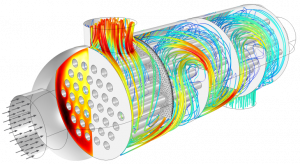Dr. Mohammad Akhlaghi,
Assistant Prof.
Turbomachines
Air engines and gas turbines
Separation of multi-phase fluids
Welcome to the Energy Conversion’s webpage.
Department of Energy Conversion is one of the largest and most active departments related to the field of energy in the country, which annually receives talented students in undergraduate, graduate and doctoral programs. Among the faculty members, 21 faculty members are active in this group, of which 12 are main members and 9 are associated members. Also, the department attracts about 10 to 15 PhD students and about 80 master’s students each year. Each year, this department allocates a suitable capacity to attract talented students without entrance exams in master’s and doctoral degrees among the graduates of the Iran University of Science and Technology as well as those of other universities in the country.
The Department of Energy Conversion uses the expertise and capability of renowned professors in various fields of energy conversion, including renewable energy, thermodynamics, heat transfer, fluid dynamics, multiphase flows, hydrodynamics and aerodynamics, turbochargers, and water turbines, fuels and combustion, energy storage, optimization of energy systems, microfluidics, nanofluids, transfer phenomena in porous media, etc. The educational and research activities of the faculty members of the Department of Energy Conversion include a wide range of analytical, numerical and experimental studies in the above-mentioned fields, which meet the scientific needs of various industries such as power plant, automotive, aerospace, marine, and oil and gas industry. According to the statistics of the graduates over the past years, the vast majority are working in the areas related to their field of study, and many of them are among the top entrepreneurs in the country.
The Department of Energy Conversion has laboratories and workshops on “Fluid Mechanics”, “Heat Transfer”, “Thermodynamics”, “Thermal Machines” and “Measurement Systems” and “HVAC Systems”, along with 7 research laboratories including “Combustion”, “Heat Transfer”. “Energy, Water and Environment”, “Renewable Energy and New Energy Technologies”, “Turbomachine”, “Applied Multiphase Fluid Dynamics”, “Liquefied Gas and Cryogenic” and “Applied Hydrodynamics” which provide a cutting-edge research space for students. The results of the research of the faculty members and laboratories are presented continuously in the form of national and international patents, books and articles published in prestigious journals. The faculty members also carry out industrial projects to solve the country’s problems and help to advance its goals.
Many scientific and research activities carried out in the department are in direct interaction with industries to solve the current problems of the country’s industry sector. In addition, the establishment of innovation centers has provided a good space for students and graduates of the department to turn their ideas into products in order to create employment opportunities and valueadded products. To this end, the Energy Innovation Center is operating under the supervision of the Department of Energy Conversion.
Dr. Majid Siavashi
Head of the Energy Conversion Department
Fluid flow and its interactions with the environment is a subject that is used in many scientific issues in various branches of engineering including mechanical engineering, civil engineering, chemical engineering, materials engineering, petroleum engineering and so on. The phenomenology of fluid dynamics through laboratory studies, development of mathematical models and their solution by developing computational methods and analytical solution tools are used in fluid dynamics.


In a wide range of industrial issues, in addition to the phenomenon of momentum transfer, attention to the phenomenon of heat transfer plays an important and fundamental role in the performance of systems. Therefore, this research area, similar to Fluid Dynamics, is a general topic that can be used in various fields and is used in such fields as cooling systems, heat exchangers, combustion and combustion engines, air conditioning, power plant, and so on.
Due to the depletion of fossil fuels, attention has been paid to renewable energy sources such as wind energy, solar energy, biomass, geothermal energy, and ocean energy. In addition, various methods of energy conversion and storage will complement the supply chain and renewable energy management. Fuel cells, hydrogen production as an energy carrier, proper use of energy resources and sustainable development are other topics of interest in this research area.

In this research area, using various modeling methods in different levels, simulation and modeling of power production cycles are performed with the aim of optimizing power generation processes and cycles by considering the economic issues. Thus, by increasing the yield of cycles and reducing the pollution, an important step can be taken to achieve a sustainable development.
The oil and gas industry covers a wide range of studies in three areas: upstream, middle, and downstream, in which Mechanical Engineering plays a significant role. The research in the area of Oil and Gas includes hydrocarbon resource exploration, fluid dynamics and heat transfer analyses to enhance oil recovery, design and manufacturing of various mechanical equipment for exploration, extraction, refining and distribution of oil and gas products, design and analysis of distribution networks.

Turbomachines
Air engines and gas turbines
Separation of multi-phase fluids
Enhanced Oil Recovery
Multi-phase Flow in Porous Media
Inverse heat transfer methods
Boiling Heat Transfer in Natural Circulation
HVAC&R
Two-Phase Flow
Optimum Thermal System Design and Analysis
Renewable Energy
Novel Energy Conversion Systems
Application of AI and ML in Energy systems
CO2 Capture and Fuel Production
Battery Thermal Management
Energy Conversion and Storage Systems
Sustainable and Renewable Energy
Optimization of Energy Systems
Hydro/Aerodynamics
Simulation of Vortical Flow
Design of Process Plant and Machinery
Convection and Thermal Radiation Heat Transfer
Two-Phase Heat Transfer
HVAC
Automotive Engineering
Lithium Battery
Computational Fluid Dynamics
Drying and Dryers
CFD and parallel processing
HVAC and solar energy systems
High temperature fuel cells
Advanced machining
Direct energy conversion systems
Aerodynamics and Aeroacoustics
Turbulent Combustion
Energy and Renewable energies
Combustion and Gasification
Atomization and Sprays
Advanced propulsion systems
Biofluid-Mechanics
Tissue and Cell Engineering
Simulation and Modeling in Biological System
Aerodynamic Optimization of Tall Buildings
Gas Turbine Optimization
Computational Fluid Dynamics
Sustainable and Clean Manufacturing
Machining of Composites and Metals
High Performance Manufacturing